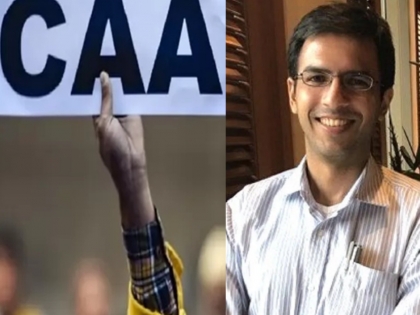CJI DY Chandrachud’s Son Abhinav Chandrachud’s Old Video Speaking About CAA Goes Viral | Watch
By Lokmat English Desk | Published: March 13, 2024 09:06 PM2024-03-13T21:06:25+5:302024-03-13T21:08:12+5:30
Following the recent notification of the Citizenship Amendment Act (CAA) 2019 by the central government, which has sparked criticism ...

CJI DY Chandrachud’s Son Abhinav Chandrachud’s Old Video Speaking About CAA Goes Viral | Watch
Following the recent notification of the Citizenship Amendment Act (CAA) 2019 by the central government, which has sparked criticism from various quarters, a video from 2020 featuring advocate Abhinav Chandrachud has resurfaced and is gaining traction online. Abhinav, the son of current Chief Justice of India DY Chandrachud, offers a critique of the constitutionality of the CAA in the viral video.
The video has been shared by Rajya Sabha MP and Shiv Sena (UBT) leader Priyanka Chaturvedi on X. "Do listen to Abhinav Chandrachud on not just CAA but also the constitutional gaps over the years on citizenship," She wrote on X while sharing the video.
In the video, Abhinav Chandrachud raises questions about the CAA's selective inclusion criteria and its implications. He highlights the exclusion of certain groups, such as Jews, Christians, Buddhists, and atheists, from the provisions of the act.
"Then Christians and Buddhists have their own country too...we have not included atheists..you excluded agnostics who don't know whether there is a God or not. You have left out Muslims who may be considered minorities in Pakistan and Bangladesh..." he said.
Read Also | What Is CAA? All You Need To Know About Citizenship Amendment Act Rules
Do listen to Abhinav Chandrachud on not just CAA but also the constitutional gaps over the years on citizenship. pic.twitter.com/c39Imcu9uf
— Priyanka Chaturvedi🇮🇳 (@priyankac19) March 13, 2024
"The residence requirement in India has been reduced by the Citizenship Amendment Act. So anyone else who wants to apply to be a citizen by naturalisation has to reside in India for 11 years. But for somebody who falls under the Citizenship Amendment Act, the residency requirement is only five years. Look how this applies to Parsis. Parsis originally fled Iran. A Parsi who fled Iran and came to India has to wait 11 years to be naturalised as a citizen but a Parsi who flees Afghanistan has to wait only 5 years. This does not make any sense to me." Abhinav said in the video.
The Centre implemented the CAA by notifying the rules four years after the contentious law was passed by Parliament to fast-track citizenship for undocumented non-Muslim migrants from Pakistan, Bangladesh and Afghanistan who came to India before December 31, 2014. With this, the Centre will now start granting Indian nationality to persecuted non-Muslim migrants from the three countries.
The Union Home Ministry officially notified the rules for the implementation of the Citizenship Amendment Act (CAA) on Monday, a move anticipated ahead of the impending Lok Sabha election schedule announcement. The rules, formulated by the Narendra Modi government and passed by Parliament in 2019, aim to grant Indian citizenship to persecuted non-Muslim migrants from Bangladesh, Pakistan, and Afghanistan who arrived in India before December 31, 2014. Eligible communities include Hindus, Sikhs, Jains, Buddhists, Parsis, and Christians. The rules also state that the applicants will have to provide an eligibility certificate issued by a locally reputed community institution confirming that he/she belongs to "Hindu/ Sikh/ Buddhist/ Jain/ Parsi/ Christian community and continues to be a member of the above mentioned community. The applicants will also have to give a declaration that they "irrevocably" renounce the existing citizenship and that they want to make "India as permanent home", according to the rules.
Read Also |How to Apply for Indian Citizenship Under The 2019 Act Online: Step-by-Step Guide and FAQs
Open in app